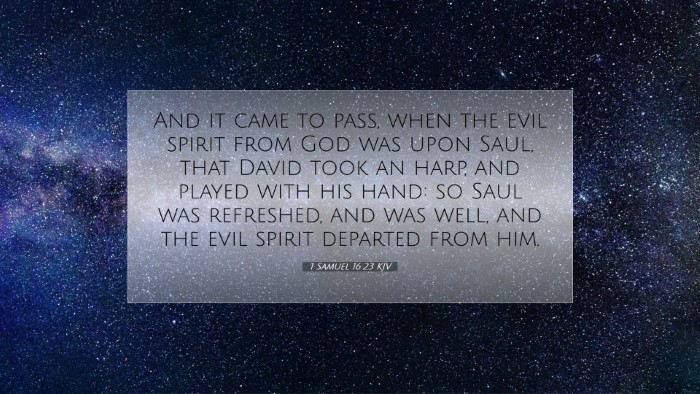Commentary on 1 Samuel 16:23
In this verse, we encounter a significant moment in the narrative of 1 Samuel. The text states:
"And it came to pass, when the evil spirit from God was upon Saul, that David took an harp, and played with his hand: so Saul was refreshed, and was well, and the evil spirit departed from him." (1 Samuel 16:23)
This passage highlights the complexity of Saul's mental and spiritual state, as well as the role David would play in his life as both a servant and a future king.
Overview of the Context
The context of 1 Samuel 16 is pivotal in understanding the transitional phase of Israel's monarchy, moving from Saul to David. Here are some key elements to consider:
- The Anointing of David: Earlier in the chapter, the prophet Samuel is called to anoint David, signaling God’s choice for the next king of Israel.
- Saul’s Disobedience: Saul had previously disobeyed God's commands, which led to the withdrawal of God's Spirit from him.
- Saul’s Distress: The "evil spirit from God" indicates a divine judgment and spiritual turmoil that would afflict Saul.
Analysis of Key Themes
1. The Distressing Spirit
Matthew Henry notes that the "evil spirit from God" signifies not a moral or inherent evil but rather the withdrawal of God's support, which left Saul vulnerable to despair and anxiety. This condition emphasizes God’s sovereignty and the consequences of Saul's actions.
2. The Role of Music
Music serves as a divine gift, a tool for healing in this context. Adam Clarke elaborates that David’s harp playing brought comfort to Saul, reflecting the therapeutic power of music. This suggests that music can play a significant role in alleviating mental distress, resonating with the spiritual and emotional healing characteristic of David’s music.
3. God's Sovereignty in Suffering
Albert Barnes comments on the dual nature of Saul’s suffering. While it was God who allowed this spirit to torment Saul, it also served a higher purpose in God's plan—the elevation of David. This duality reveals the complexities of divine providence, where even suffering can serve God’s overarching plan.
Practical Implications for Modern Readers
As contemporary theologians and pastors reflect on this passage, several application points arise:
- The Importance of Mental Health: This narrative highlights the importance of addressing mental and emotional distress within the community. Just like Saul found relief through David's music, modern ministry can seek to provide avenues for healing—both spiritual and psychological.
- Role of Worship: Music, especially in worship settings, can foster an environment where individuals encounter God and find refuge from their struggles. This suggests the significance of including music and arts in church ministry.
- Divine Purpose in Trials: Understanding that God can use our struggles for greater purposes encourages faith during difficult times, affirming that God is sovereign over our experiences.
Conclusion
The narrative of 1 Samuel 16:23 is rich with theological insight and practical applications. The contrasting experiences of Saul and David remind us that God reigns sovereignly, even in our tumultuous moments. The use of music and the pursuit of harmony in worship reflect core values for the church's mission today. By wrestling with these texts, pastors and scholars can further understand the depth of human experience and divine intervention.


